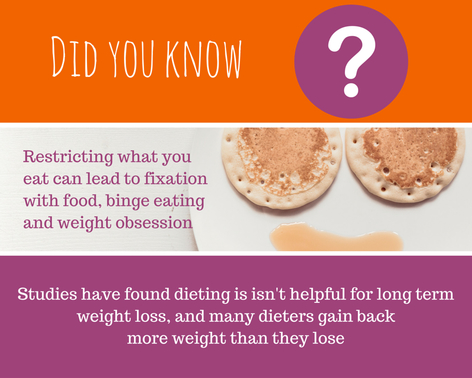Dieting
Dieting is when people change the way they eat, usually in order to lose weight. It can involve avoiding certain foods, decreasing the amount of food we eat, or really any other kind of rules used to change our eating.
While it’s great to be considerate of what you are eating, dieting can turn every day eating into an obsession, which can lead to a negative self-image. Not achieving goals or slipping up and eating something ‘naughty’ can encourage unnecessary negative thoughts.
Dieting MAY be appropriate in certain situations, but can be dangerous for growing children and teens. Talk to your doctor for a referral to a dietitian if you think you need to go on a diet.
Fad diets
Fad diets that encourage cutting out entire food groups can be especially dangerous as you can miss out on key things your body needs. Check out our mythbusting of fad diets.

What should I eat?
To get more of an idea about what should be on your plate, take a look at the Australian Guide to Health Eating. It recommends getting back to basics and eating a variety of nutritious foods from all five food groups:
- Grains and cereals (mostly whole grain)
- Fruits
- Vegetables and legumes (as many types and colours as possible)
- Milk, yoghurt, cheese (mostly reduced fat)
- Lean meat, poultry, fish, eggs or tofu
Balancing our meals throughout the day is also important; it keeps you full and makes sure you have enough energy to get you through the day. Try to have three main meals and two or three small snacks every day.
Sources:
National Health and Medical Research Council 2013, Australian Guide to Healthy Eating, viewed 3rd August 2015, www.eatforhealth.gov.au/sites/default/files/files/the_guidelines/n55i_australian_guide_to_healthy_eating.pdf
Casey, A. 2007, Eating Disorder Group






